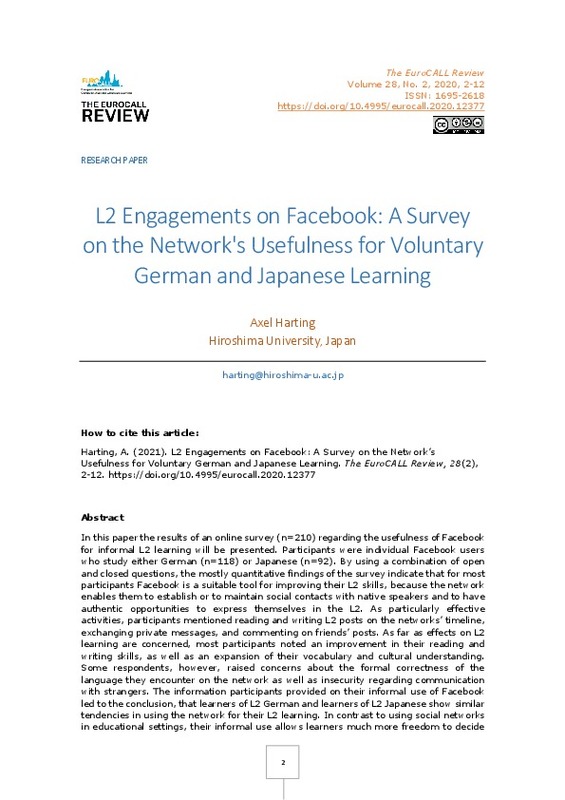JavaScript is disabled for your browser. Some features of this site may not work without it.
Buscar en RiuNet
Listar
Mi cuenta
Estadísticas
Ayuda RiuNet
Admin. UPV
L2 Engagements on Facebook: A Survey on the Network's Usefulness for Voluntary German and Japanese Learning
Mostrar el registro sencillo del ítem
Ficheros en el ítem
| dc.contributor.author | Harting, Axel
|
es_ES |
| dc.date.accessioned | 2021-02-24T11:28:04Z | |
| dc.date.available | 2021-02-24T11:28:04Z | |
| dc.date.issued | 2020-09-30 | |
| dc.identifier.issn | 1695-2618 | |
| dc.identifier.uri | http://hdl.handle.net/10251/162319 | |
| dc.description.abstract | [EN] In this paper the results of an online survey (n=210) regarding the usefulness of Facebook for informal L2 learning will be presented. Participants were individual Facebook users who study either German (n=118) or Japanese (n=92). By using a combination of open and closed questions, the mostly quantitative findings of the survey indicate that for most participants Facebook is a suitable tool for improving their L2 skills, because the network enables them to establish or to maintain social contacts with native speakers and to have authentic opportunities to express themselves in the L2. As particularly effective activities, participants mentioned reading and writing L2 posts on the networks’ timeline, exchanging private messages, and commenting on friends’ posts. As far as effects on L2 learning are concerned, most participants noted an improvement in their reading and writing skills, as well as an expansion of their vocabulary and cultural understanding. Some respondents, however, raised concerns about the formal correctness of the language they encounter on the network as well as insecurity regarding communication with strangers. The information participants provided on their informal use of Facebook led to the conclusion, that learners of L2 German and learners of L2 Japanese show similar tendencies in using the network for their L2 learning. In contrast to using social networks in educational settings, their informal use allows learners much more freedom to decide when, how often, with whom, on which topic, and in which way they wish to interact in their target language on the network. | es_ES |
| dc.language | Inglés | es_ES |
| dc.publisher | Universitat Politècnica de València | es_ES |
| dc.relation.ispartof | The EuroCALL Review | es_ES |
| dc.rights | Reconocimiento - No comercial - Sin obra derivada (by-nc-nd) | es_ES |
| dc.subject | es_ES | |
| dc.subject | Autonomous learning | es_ES |
| dc.subject | Computer-mediated communication | es_ES |
| dc.title | L2 Engagements on Facebook: A Survey on the Network's Usefulness for Voluntary German and Japanese Learning | es_ES |
| dc.type | Artículo | es_ES |
| dc.identifier.doi | 10.4995/eurocall.2020.12377 | |
| dc.rights.accessRights | Abierto | es_ES |
| dc.description.bibliographicCitation | Harting, A. (2020). L2 Engagements on Facebook: A Survey on the Network's Usefulness for Voluntary German and Japanese Learning. The EuroCALL Review. 28(2):2-12. https://doi.org/10.4995/eurocall.2020.12377 | es_ES |
| dc.description.accrualMethod | OJS | es_ES |
| dc.relation.publisherversion | https://doi.org/10.4995/eurocall.2020.12377 | es_ES |
| dc.description.upvformatpinicio | 2 | es_ES |
| dc.description.upvformatpfin | 12 | es_ES |
| dc.type.version | info:eu-repo/semantics/publishedVersion | es_ES |
| dc.description.volume | 28 | es_ES |
| dc.description.issue | 2 | es_ES |
| dc.relation.pasarela | OJS\12377 | es_ES |
| dc.description.references | Alm, A. (2015). Facebook for informal language learning: Perspectives from tertiary language students. The EUROCALL Review, 23(2), 3-18. https://doi.org/10.4995/eurocall.2015.4665 | es_ES |
| dc.description.references | Araya Ríos, J. & Campos, L. E., (2015). The Role of Facebook in Foreign Language Learning. Revista de Lenguas Modernas, 23, 253-262. https://doi.org/10.15517/rlm.v0i23.22349 | es_ES |
| dc.description.references | Dizon, G. (2015). Japanese students' attitudes toward the use of Facebook in the EFL classroom. The Language Teacher, 39(5), 9-14. https://doi.org/10.37546/JALTTLT39.5-2 | es_ES |
| dc.description.references | Dizon, G. (2016). A comparative study of Facebook vs. paper-and-pencil writing to improve L2 writing skills. Computer Assisted Language Learning, 29(8), 1249-1258. https://doi.org/10.1080/09588221.2016.1266369 | es_ES |
| dc.description.references | Harting, A. (2017). Using Facebook to improve L2 German students' socio-pragmatic skills, The EuroCALL Review, 25(1), 26-35. https://doi.org/10.4995/eurocall.2017.7014 | es_ES |
| dc.description.references | Harting, A. (2018). Schwierigkeiten bei der Bewältigung von Facebook-Aufgaben im Deutschunterricht in Japan, Neue Beiträge zur Germanistik, 157, 155-179. https://doi.org/10.11282/jgg.157.0_155 | es_ES |
| dc.description.references | Leier, V. & Cunningham, U. (2016) "just facebook me" A study on the integration of Facebook into a German language curriculum. Limassol, Cyprus: EUROCALL conference: 260-264. https://doi.org/10.14705/rpnet.2016.eurocall2016.572 | es_ES |
| dc.description.references | Manca, S. & Ranieri, M. (2016). Facebook and the others. Potentials and obstacles of Social Media for teaching in higher education. Computers & Education, 95(1), 216-230. https://doi.org/10.1016/j.compedu.2016.01.012 | es_ES |
| dc.description.references | Prichard, C. (2013). Training L2 Learners to Use Facebook Appropriately and Effectively. CALICO Journal, 30(2), 204-225. https://doi.org/10.11139/cj.30.2.204-225 | es_ES |
| dc.description.references | Promnitz-Hayashi, L. (2011). A learning success story using Facebook. Studies in Self-Access Learning Journal, 2(4), 309-316. https://doi.org/10.37237/020408 | es_ES |
| dc.description.references | Sim, M. A. & Pop, A. M. (2014). The impact of social media on vocabulary learning case study: Facebook, Annals of the University of Oradea, Economic Science Series, 23(2), 120-130. | es_ES |
| dc.description.references | Stevenson, M.P., & Liu. M. (2010). Learning a language with Web 2.0: Exploring the use of social net-Learning a language with Web 2.0: Exploring the use of social net-working features of foreign language learning websites. CALICO Journal, 27, 233-259. https://doi.org/10.11139/cj.27.2.233-259 | es_ES |
| dc.description.references | Wang, S., & Vasquèz, C. (2012). Web 2.0 and second language learning: what does the research tell us? CALICO Journal, 29(3). 412-429. https://doi.org/10.11139/cj.29.3.412-430 | es_ES |
| dc.description.references | Waragai, I., Kurabayashi, S., Ohta, T., Raindl, M., Kiyoki, Y. & Tokuda, H. (2014). Context-aware writing support for SNS: connecting formal and informal learning. In L. Bradley & S. Thouësny (Eds.), CALL design: principles and practice. Proceedings of the EUROCALL 2014 Conference, 403-407. https://doi.org/10.14705/rpnet.2014.000253 | es_ES |
| dc.description.references | White, J. (2009). The use of Facebook to improve motivation and academic writing. Proceedings of the Third International Wireless Ready Symposium, 28-32. | es_ES |








